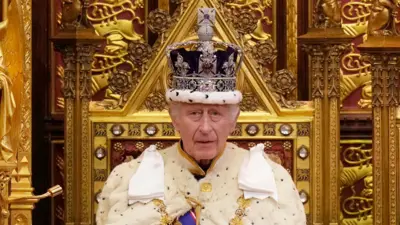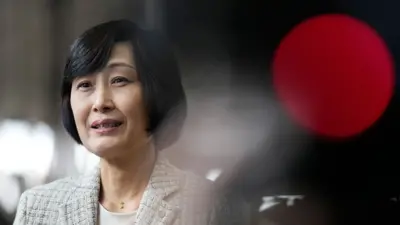We've updated our Privacy and Cookies Policy
We've made some important changes to our Privacy and Cookies Policy and we want you to know what this means for you and your data.
Couple in damages fight over vaccine side effects
- Kerry Hurt had a stroke two weeks after her first dose of the AstraZeneca vaccine
- She said her life has been "devastated" but still encouraged people to have the jab
- The government said severe side effects as a result of Covid-19 vaccines were "very rare"
A woman has described how she had to learn how to talk again after she said she was left partially-paralysed due to the side effects of her Covid-19 vaccine.
Kerry Hurt, from Rotherham, suffered a stroke after undergoing surgery for a blood clot two weeks after having the AstraZeneca jab.
Mrs Hurt said it had "devastated" her life but still encouraged people to have the vaccine if they wanted it.
A government spokesperson said severe side effects were "extremely rare" and affected 1 in 100,000 people having first doses.
Mrs Hurt said she began to notice symptoms, starting with headaches, a week after having her first vaccine.
After being referred to A&E in Rotherham in April she was told she had a blood clot on her brain, leading to a stroke and two rounds of life-saving surgery.
"I've had to learn how to talk again, had to learn how to eat again and I'm currently learning how to walk again," she said.
"It's devastated my life. I can't even get myself to the toilet anymore."
Her husband, Pat, said her partial paralysis had "turned life upside down", and had left them needing to fundraise for private physio appointments.
"She is one determined lady," he said. "30 seconds changed someone's life. It's crucified us. Ruined us."
The couple said they went for their vaccines in order to go on holiday to Turkey and have encouraged others to have a jab if they want it.
"We both did it for the right reasons, we're not anti-vaccines by any means," Mr Hurt said.
Blood clots from vaccines are estimated to occur with 1 in 100,000 people over the age of 40 or those with underlying medical conditions.
For people aged under 40, the risk increases to 1 in 50,000 people.
In May, the government moved to offer an alternative to the AstraZeneca jab for people aged under 40 due to a link with rare clots.
The latest estimates indicate that the vaccination programme has directly averted more than 230,800 hospitalisations with coronavirus, Public Health England said.
The University of Oxford said the risk of having a blood clot was greater from catching Covid-19 when compared with having a first vaccine dose.
Mrs Hurt said she had been trying to claim compensation from the Vaccine Damage Payment Scheme (VDPS).
She said despite her life being affected, claiming was difficult and full of "red tape", having not been updated since 1979.
"I had the vaccine thinking I was doing the right thing," she said.
"I did it when the government asked me to do it to protect each other and myself, but now I feel like I'm getting nothing back from the government to say 'we acknowledge you did what we asked but unfortunately for you it's gone wrong'."
The NHS, which took on the VDPS from the government on 1 November, said links between the vaccine and side effects were still being investigated.
"This means it will take longer before it can be determined if an individual’s claim meets the first legal test of causation," a spokesperson said.
"We know this is a distressing wait for claimants and their families."
Follow BBC Yorkshire on Facebook, Twitter and Instagram. Send your story ideas to yorkslincs.news@bbc.co.uk or send video here.
Top Stories
Features & Analysis
Most read
Content is not available








